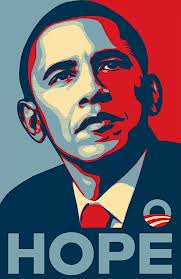(Good question, this has frustrated me for Barack Obama’s entire presidency. I mean, heck, the Republicans had a meeting on the night of Obama’s first inauguration, in which they vowed to oppose anything he did. They promised to make him a 1-term president and make him “fail.” At that point, you know, just f*** ’em and ram through your legislation! You know they’d do the same! – promoted by lowkell)
 I have never been as excited about a political leader as I was about Barack Obama at the time of his election in 2008. A year later, in considerable distress, I published as an op/ed in the Baltimore Sun , an open letter to the president calling upon him to stop giving his power away to his enemies so that he could do the job he was elected to do.
I have never been as excited about a political leader as I was about Barack Obama at the time of his election in 2008. A year later, in considerable distress, I published as an op/ed in the Baltimore Sun , an open letter to the president calling upon him to stop giving his power away to his enemies so that he could do the job he was elected to do.
It is because of your failure to fight back that the Republican Party – behaving more scandalously than any political opposition in memory – has grown stronger, while you have grown weaker [I wrote in late 2009]… Your opponents are relentless, single-minded and ruthless in their efforts to weaken and destroy you. This is a continuation of the same struggle for which Americans chose you to be their champion. It’s your job not to ignore the battle but to fight and win it.
That was a year before the Republicans swept away the huge Democratic majority in the House of Representatives with their own huge majority, and the problem I wrote about in 2009 persists still.
The Republican opposition has consistently treated President Obama as an outright enemy. They’ve done everything they could to make him fail. They’ve successfully delegitimized him with their base. And they’ve treated him with contempt, far from according him the usual degree of respect that has traditionally been given to a president even by his political opponents.
Meanwhile, with a few scattered gestures aside, President Obama has never fought back with anywhere near the intensity — not to say the ferocity — that his enemies bring to their fight against him.
It is remarkable, really-even bizarre. No one becomes President of the United States without having an extraordinarily strong desire for power. But here is a man who labored long and hard to gain the most powerful position on the planet who then showed less acumen in coping with a power struggle than the average boy on the playground.
In the years I’ve been discussing this astonishing failure to stand and fight effectively, I’ve found that a great many of the president’s other supporters are eager to maintain that he’s doing the best that can be done under the circumstances.
He’s black, runs one excuse, and the American public would respond adversely were he to act like “an angry black man.” But he could making his enemies pay a price for their disgraceful and destructive conduct without a display of anger. Besides, President Obama has thrown a good jab here and there, almost always succeeding with those more aggressive gestures in moving the political struggle his way. The problem is that every time he gets his opponent on the ropes, he backs off and lets his opponent regain his strength.
He came into office at a time the economy was tanking, runs another argument, so his hands were tied. But FDR came to power in the depths of the Great Depression, and he used that circumstance as an opportunity to transform the country.
(People on the far left, meanwhile, often “explain” the president’s inability to fight with the assertion that he’s really in cahoots with the Republicans. He only pretends to favor what he says he wants, this argument goes, so every time the Republicans prevail Obama is actually winning also. I don’t buy that, either. When in American history have we ever seen collusion of this sort, and when have we ever seen a political leader voluntarily arranging for himself to appear weak, thwarted, and defeated by his political foes?)
So what explains this incongruence, this man who – against all odds – succeeded in gaining power and then showed so little ability or inclination to fight against those whose main desire was to strip that power from him?
I don’t know how many hundreds of hours I’ve spent pondering this question, some of it publicly in written form. But I’ve never been satisfied with any answer I’ve come up with. That we’re dealing with something at the level of character structure seemed clear, but I didn’t have much of a picture of what it was.
Now a new idea has come to me. It is but a speculation — call it a “clinical insight” – but I do think I’m onto something. And I will articulate these new thoughts in the next installment.



 Sign up for the Blue Virginia weekly newsletter
Sign up for the Blue Virginia weekly newsletter








